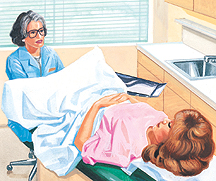Genital Warts (Condyloma)
Genital warts (also called condyloma) are caused by a virus that is often transmitted sexually. This virus is known as human papillomavirus (HPV). The warts are often so tiny that they are hard to see. But even tiny warts can cause big trouble, especially in women. Genital warts can cause cell changes that can lead to genital cancers such as cervical cancer. Warts can even be passed to babies during childbirth.
Note: Latex condoms may help protect against genital warts. But condoms don't cover all the areas that can get infected. That means condoms may not protect you completely.
Symptoms

An exam by a healthcare provider is often the only way to tell if a woman has genital warts.
Genital warts can be flat. Or they can be raised and look like tiny cauliflowers. They can grow on the penis, vagina, or cervix. They can also grow in and around the rectum, and even in the throat. You can have the virus for many months before the warts appear. Or you may have the virus but never develop visible warts. Once warts form, they are often too small to be noticed. That's why you need regular exams by your healthcare provider. He or she can find tiny warts and can check your cells for changes that mean the virus is present.
Treatment
Genital warts tend to grow with time. The smaller the warts are, the easier they are to remove. So don't delay. Warts are most often removed with chemicals. Sometimes they're frozen off with liquid nitrogen. Warts may also be removed with heat or laser. More than one treatment may be needed. Never try to treat genital warts yourself.
Prevention
To prevent genital warts, consider getting vaccinated. Your healthcare provider can tell you if the vaccine is right for you. Also know your partner's sexual history. Even if someone doesn't have visible warts, he or she can still transmit the virus. Protect yourself by using latex condoms. And get regular medical exams. In women, regular Pap smears can help detect changes caused by genital warts and catch any signs of cervical cancer early. Also, ask your healthcare provider about the HPV vaccine.
Resource
CDC National STD Hotline 800-227-8922, www.cdc.gov/nchstp/dstd

